7.16 Shopping in Germany
Supermarkets
As in all countries, the cost of living in some German towns and cities is more expensive than it is in others. Living in Munich is significantly more costly than living in Rostock or the Ruhr area. Even within the same town it is possible to buy the same product for different prices. It is always worth comparing prices carefully. When being food, note that delicatessens are the most expensive, while specialist shops such as the baker's (die Bäckerei) or the butcher's (die Metzgerei) are not necessarily more expensive than supermarkets.
Even amongst supermarkets prices vary considerably. As a general principle, the more self-service there is a supermarket, the less you have to pay. In some supermarkets - as in the one pictured below - you will see nothing but rows of products stacked in boxes on top of one another!
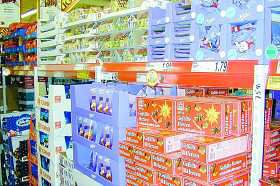 |
| A no-frills German supermarket |
|
By contrast with many other countries it is usual to weigh your fruit and vegetables yourself in German supermarkets. You simply put them on the scales, press the button with a picture of the product and stick the price tag on the plastic bag. Germans are very ecologically-minded and hence many shops charge 10-15 cents for a plastic carrier bag when you get to the checkout desk. Furthermore, the use of re-usable glass or plastic bottles (Mehrwegflaschen) is encouraged and you have to pay a deposit (der Pfand) on most bottles which will be refunded to you when you return the bottles.
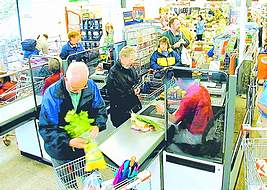 |
| At the checkout desk |
|
Other types of shops
A general food store is called "das Lebensmittelgeschäft". If a general store is small and rather old-fashioned, it is affectionately called "der Tante-Emma-Laden". Should you wish to buy organic foods and vegetables, you should look for signs saying "Bioladen" (= health food shop) or the more traditional "das Reformhaus".
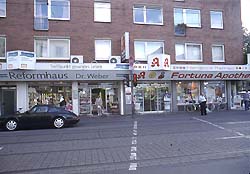 |
| Ein Reformhaus & eine Apotheke |
|
Note also the difference between a German chemist's and a drugstore. The chemist's (die Apotheke) dispense drugs and medicines. Some drugs don't require a prescription, whereas others do. Drugs are generally cheaper on prescription, but you obviously have to see a doctor. It is also possible to buy cosmetics and some health foods in an Apotheke.
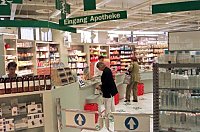 |
| The entrance to an Apotheke |
|
A drugstore (die Drogerie) on the other hand sells mainly toiletries, cosmetics and films etc, although it will sell some medicines if they are not on prescription. More upmarket and thus more expensive than a Drogerie is "die Parfümerie", where you can get mainly perfumes and cosmetics.
Markets
Almost all towns, big or small, have one or two markets days a week, often on Wednesday or Saturday mornings. This can vary however - some towns have a permanent market open throughout the week. Quite a few of the stalls are run by local vegetable growers, and are of very high standard. Particularly attractive for visitors are the Christmas markets ("Weihnachtsmärkte"), at which you can buy sweets, pastries and hand-carved Christmas decorations.
Re-cycling
To a much greater extent than in other countries Germany practises the re-cycling of waste products. A "throw-away mentality" (die Wegwerfmentalität) is frowned upon and people are encouraged to purchase environmentally friendly products (umweltfreundliche Produkte) which are recognisable by the symbol of the "blue angel" (der blaue Engel) - see below - and which can be recycled at places indicated by the green dot symbol (der grüne Punkt).

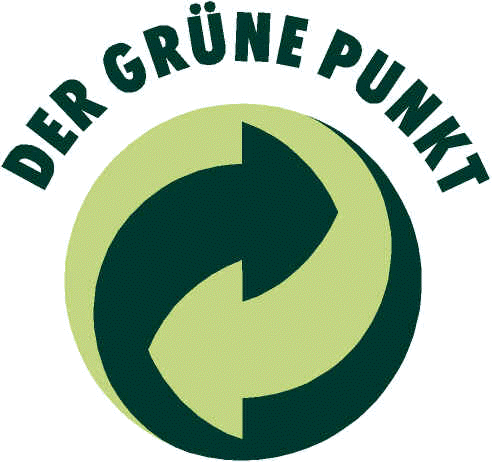 Citizens are also informed by brochures produced by the municiple authorities how to sort their rubbish (die Mülltrennung), i.e. put different kinds of material into different dustbins. Consequently there are dustbins and containers for used paper, glass (which is sorted according to colour), packaging material, organic waste, and residual waste. Yellow sacks are used for recyclable material, green for biodegradable material and black for the rest. The yellow and green bags are taken away free of charge, but you have to pay to have the rest collected. In the street, rubbish is put into the appropriate bin for recycling. Glass bottles should not be thrown into containers on Sundays or at night because of the noise. Citizens are also informed by brochures produced by the municiple authorities how to sort their rubbish (die Mülltrennung), i.e. put different kinds of material into different dustbins. Consequently there are dustbins and containers for used paper, glass (which is sorted according to colour), packaging material, organic waste, and residual waste. Yellow sacks are used for recyclable material, green for biodegradable material and black for the rest. The yellow and green bags are taken away free of charge, but you have to pay to have the rest collected. In the street, rubbish is put into the appropriate bin for recycling. Glass bottles should not be thrown into containers on Sundays or at night because of the noise.
Mail order
 Home shopping has affected German buying habits severely - according to the German Mail Order Association, Germany ranks second in the world among home-shopping giants behind the USA. The Association reported that in 1996, 49% of Europe's mail-order trade came from German citizens. They also reported that there are at least 20 main mail order companies, 12 of which are based in Germany and of these twelve, two are the largest houses in the world. This means that around 350 million catalogues are printed each year, which works out to be about four catalogues per person or at least 10 catalogues per household in Germany. Catalogue houses advertise heavily and you are almost guaranteed to receive something unsolicited from them in the mail. Sometimes it's the catalogue itself or a postcard inviting you to order the catalogue. Larger houses, such as Otto, Neckermann or Quelle send regular post card invitations asking 'occupants' to fill-in the card and return it to receive a free gift. Home shopping has affected German buying habits severely - according to the German Mail Order Association, Germany ranks second in the world among home-shopping giants behind the USA. The Association reported that in 1996, 49% of Europe's mail-order trade came from German citizens. They also reported that there are at least 20 main mail order companies, 12 of which are based in Germany and of these twelve, two are the largest houses in the world. This means that around 350 million catalogues are printed each year, which works out to be about four catalogues per person or at least 10 catalogues per household in Germany. Catalogue houses advertise heavily and you are almost guaranteed to receive something unsolicited from them in the mail. Sometimes it's the catalogue itself or a postcard inviting you to order the catalogue. Larger houses, such as Otto, Neckermann or Quelle send regular post card invitations asking 'occupants' to fill-in the card and return it to receive a free gift.
 |
Web Links |
 |
| Internet sites on shopping in Germany |
 |
Blauer Engel |
The information page for the Blue Angel symbol which marks German products with positive environmental features on the German market. |
 |
Der Grüne Punkt |
The homepage of the Green Dot. |
 |
BNN Herstellung und Handel |
Visit the English-language pages of the German Organic Producers and Traders Association. |
 |
Christmas markets |
Information about the most famous Christmas markets worldwide and where they can be found. |
 |
Kaum noch Tante-Emma-Läden im Ort |
A ZDF report on how small German corner stores are disappearing due to competition from German supermarkets. In German only. |
 |
Supermarktcheck.de |
Use this online guide to check where the nearest supermarket is in Germany. |
 |
Flohmarkt.de |
A homepage for people who wish to look for antiques and bargains in German flea-markets. |
|
 Chapter 7: Exercises Chapter 7: Exercises

 Print This Page Print This Page
|